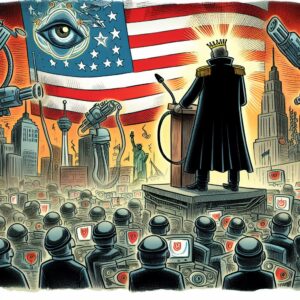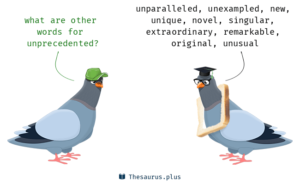
King Trump Surveying His Kingdom
In recent years, whispers of a dystopian future have permeated discussions about the United States. As the nation grapples with political polarization, technological advancements, and social upheavals, the prospect of the “Dystopian States of America” has become a topic of concern and speculation. This article aims to explore the factors contributing to this apprehension, examining the potential paths the nation may take and the warning signs that demand our attention.
Political Polarization
One of the key factors fueling the fear of a dystopian America is the deepening political polarization that has taken root in the country. Over the past few decades, the ideological divide between Republicans and Democrats has grown increasingly wide, hindering effective governance and fostering an atmosphere of mistrust.
In a dystopian scenario, this polarization could intensify, leading to a fractured society where citizens are pitted against each other based on their political affiliations. The erosion of democratic values and compromise may result in a political landscape dominated by authoritarian tendencies, where the rights of individuals are sacrificed for the sake of ideological purity.
Erosion of Civil Liberties
A dystopian America might witness a gradual erosion of civil liberties under the guise of maintaining order and security. In such a scenario, surveillance technologies could be employed to monitor citizens, stifling dissent and curbing freedom of expression. The right to privacy, a cornerstone of democratic societies, might be sacrificed in the name of national security, leading to a society where citizens feel constantly under scrutiny.
The use of advanced technologies, including artificial intelligence and facial recognition, could further amplify the government’s control over its citizens. In this dystopian vision, individual autonomy is sacrificed for the illusion of collective safety, creating a society where personal freedoms are a distant memory.
Economic Inequality
Another critical aspect contributing to the dystopian narrative is the widening gap between the rich and the poor. Economic inequality has been a persistent issue in the United States, and if left unaddressed, it could evolve into a dystopian reality where a small elite controls the majority of resources, leaving the rest of the population in poverty and desperation.
In a society where economic opportunities are concentrated in the hands of a privileged few, social unrest becomes inevitable. The disenchanted masses may revolt against a system that perpetuates inequality, potentially leading to a breakdown of social order and the rise of authoritarian measures to maintain control.
Climate Crisis
The looming climate crisis adds another layer to the dystopian narrative. As extreme weather events become more frequent and resource scarcity intensifies, the struggle for survival could exacerbate existing social, economic, and political tensions.
In a dystopian future, the effects of climate change may disproportionately impact marginalized communities, leading to mass migrations, resource wars, and increased geopolitical instability. The government’s response to these challenges could determine whether the nation steers towards resilience or descends into chaos.
Cultural Fragmentation
Cultural fragmentation, fueled by social media and echo chambers, is a significant concern in the context of a dystopian America. If citizens retreat into isolated bubbles of information, guided by algorithms that reinforce their existing beliefs, the fabric of societal cohesion may unravel.
A society divided along cultural lines may struggle to find common ground and build a collective identity. This fragmentation could open the door to manipulation by external forces or opportunistic leaders who exploit divisions for their gain, further eroding the foundations of a united and resilient nation.
Conclusion
While the concept of the Dystopian States of America may seem like a far-fetched and exaggerated notion, it is essential to recognize the warning signs embedded in the current socio-political landscape. The path the nation takes in the coming years will be shaped by the choices made today.
Addressing political polarization, safeguarding civil liberties, tackling economic inequality, mitigating the impact of climate change, and promoting cultural unity are crucial steps in steering the United States away from a dystopian future. By acknowledging these challenges and working collectively to overcome them, Americans can build a more resilient, just, and sustainable society for future generations. The choice between utopia and dystopia rests in the hands of the people, and only through informed and concerted efforts can the nation hope to avoid the ominous fate of the Dystopian States of America.

